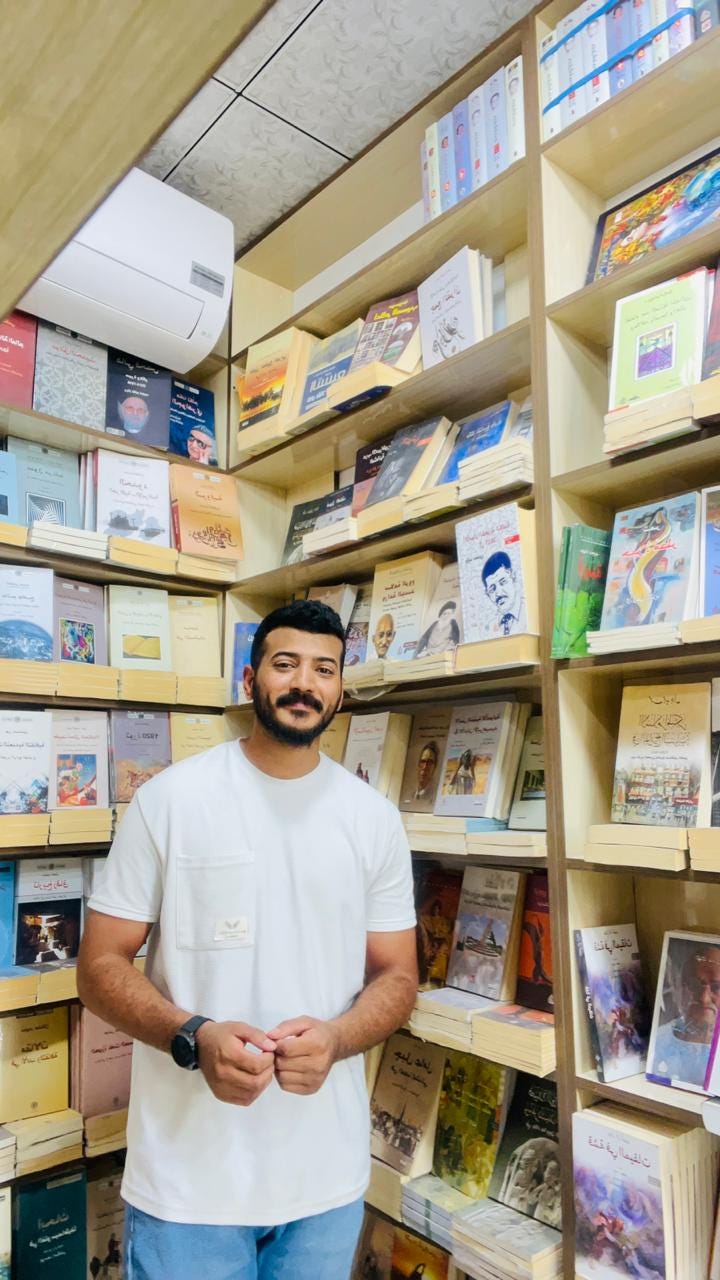A Literary Renaissance in Basra
Bookseller Mohammed Ashour is contributing to a cultural reawakening in Iraq’s former creative capital.
Flimsy covers, wonky text and chapters riven with errors—this is the trade-off for getting a novel cheap in Iraq, where the market for counterfeit books is thriving. Most foreign translations can be picked up this way, sold openly by bookshops and market stalls that hawk pirated copies for a fraction of the price. Local authors, too, find their works repackaged by unscrupulous publishers, operating in the knowledge that intellectual property rights are rarely enforced.
For Mohammed Walid Ashour, a bookseller in Basra, it’s not the missing pages or poor printing that’s the problem. As a book lover who is committed to promoting a culture of reading in his home city, he believes the rights of authors should be respected. “One of the reasons there aren’t many new Iraqi authors is that it’s difficult to make a living as a writer in Iraq at the moment,” he says.
Many Iraqis are avid readers and take pride in the old saying that “Cairo writes, Beirut prints and Baghdad reads.” But in an age of smartphones and social media, younger generations have other distractions. Ashour’s strategy is to source books that are difficult to access in southern Iraq and host regular gatherings to discuss in-demand works that range from Nietze and Schopenhauer to Mark Manson’s The Subtle Art of Not Giving a F*ck, which is particularly popular, he says.
Already, he has seen signs of change. When he opened Al Sayyab Library in 2021, there were only a handful of bookshops in Basra, a city once famed for its cosmopolitan cultural scene but better known today as the capital of Iraq’s oil production. Ashour wants to help restore the city’s creative credentials and remind people of the power of the printed page. “After we opened, the number of bookshops started increasing, so I think we are achieving something,” says Ashour, pointing to a following of over 40,000 on the bookshop’s social media.
It's one of several literary and artistic projects that Ideas Beyond Borders is supporting in Basra through Innovation Hub grants to invigorate the city’s cultural scene. “Basra used to be known for its artistic and musical output—it was a place where poetry competitions and cultural festivals gave people an outlet for creative expression,” says Faisal Al Mutar, President of Ideas Beyond Borders.
Gradually, this reputation is returning as a new generation reaches towards a heritage that has been hidden from sight. In 2021, the Basra International Book Fair attracted more than 250 international and Arab publishers, and in 2023, the world’s largest floating book fair, the Logos Hope ship, docked for a two-week stay.
A new vibrancy is creeping into the literary scene, encouraging Ashour to believe that progress is possible, even in a city as divided and downtrodden as Basra. “Mohammed Ashour is at the heart of a cultural renaissance that will bring new ideas and modes of expression to a city that has long been mired in conflict and corruption. Projects like this bring hope,” Al Mutar adds.
Most weeks, Ashour heads down to Al Farahidi Street, which now hosts a bookfair every Friday, much like the famed literary market on Al Mutannabi Street in Baghdad. He is inspired by the size of the crowds, as people browse stalls laden with books covering all manner of topics, including the inevitable counterfeit copies.
Ashour avoids these, despite pushback from some readers who ask why he doesn’t stock cheaper copies. “I believe in the rights of authors, and it also goes against my Islamic values. Copyright infringement is a kind of theft,” he says.
Instead, he prioritizes promoting local authors and securing works that cater to the tastes of his Iraqi readers, who prefer books on philosophy, sociology and human development. Works by Aristotle and Spinoza are always popular, as are the major Arabic writers, including Khalil Gibran, Lebanese author of The Prophet, and the Egyptian Nobel Prize winner Naguib Mahfouz. He also gets a lot of requests for Agatha Christie novels and Herman Melville, the author of Moby Dick.
It’s Nietze who is the most popular, though. “He focuses on human values as the most important thing in life. People read these books for insights into his point of view in the world,” he says
Ashour’s personal tastes tend toward the political. His favorite novel, Animal Farm, reads to him like an allegory of the situation in Iraq and wider trends shaping the region today. “It was written at a time when dictatorships were prevalent and fanatic leaders were in charge. Reading this reinforces the value of human rights and the importance of freedom,” he says.
It also reminds him of the mission underpinning his work as extremist narratives fuel the unrest that now defines everyday life in Iraq. For him, access to books is an antidote – a way to replace the polarization in society with pluralist thinking, nourished by a varied literary diet. “It’s important to try and educate people, to broaden their thinking and incorporate some acceptance of others,” he says.
“In times of turmoil, reading offers exposure to other cultures that can prove vital to our understanding of others.”
This article was written by Olivia Cuthbert.





